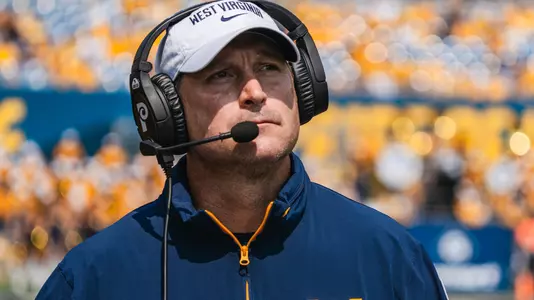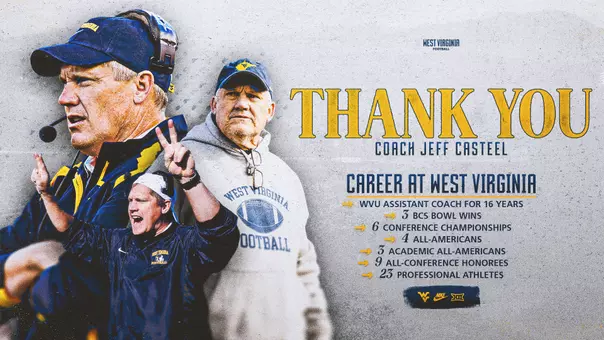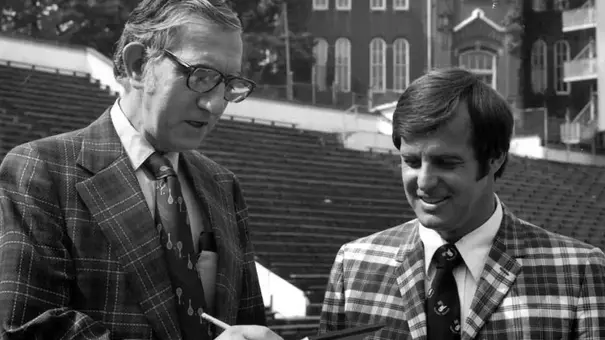
WVU’s Lesley Says Move to Press Box Permanent
October 07, 2024 04:47 PM | Football
MORGANTOWN, W.Va. – While West Virginia defensive coordinator Jordan Lesley was walking down to the locker room following the Mountaineers' 38-14 victory over Oklahoma State last Saturday, a WVU fan walking nearby encouraged him to stay up in the press box during games.
"I plan to," was Lesley's response.
Three weeks ago, following West Virginia's fourth-quarter collapse at Pitt, Lesley said he suggested to coach Neal Brown his desire to switch from being on the sidelines to sitting in the press box during games.
It was something he considered doing in the past.
"The only reason that I stayed down at the start of the year was trying to get a feel for all the changes that we've had in college football with the green dot and the (tablets), so going into it, it was more of trying to get a bead on operational things," Lesley said earlier today. "Quite honestly, what helped me make the ultimate decision was there really wasn't a big difference from what it was last year."
There are obvious benefits to being up top watching the game below, improved vision for one, but Brown believes being in a much calmer environment is probably most beneficial when it comes to in-game decision making.
"Any time you are up high, you can definitely see better than you can on the field," Brown pointed out. "When you are in the press box, what it does is it takes the emotions out of the game.
"Now, you have to ask him whether that's better or worse for him, but it does take the emotions out of the game because you are so far away," he said. "You can do some more thinking, and you can be more organized in between series because you are sitting at a table. I think there are some benefits to that."
Lesley agrees.
"It changes what the look is and how you approach each play," he said. "Obviously, you see more and kind of the bigger picture of things, and you are probably able to get your kids in some better positions than you normally would.
"There are a lot of things that go on on the sidelines, and there are a lot of moving pieces," he added. "Now, you can be two or three plays ahead, whether that's defense to special teams or offense to special teams. This kind of calms it down a little bit."
Lesley's vision from up top has coincided with West Virginia's improved play on defense in victories against Kansas and Oklahoma State.
A Mountaineer secondary that was giving up an alarming 280.7 yards per game through the air in the first three games has already sliced into that significantly by an average of 37 yards in their last two outings.
Kansas passed for just 184 yards in West Virginia's come-from-behind victory on Sept. 21, and last week, Oklahoma State threw for 191 yards, or 129 fewer yards than its season average coming into the contest.
Heading into this Saturday's "Coal Rush" affair against Iowa State, the Mountaineer secondary is now surrendering 243.4 yards per game.
The defense came up with its first interception of the season in the Kansas victory and added two more picks last Saturday. Oklahoma State's offense was completely stifled, getting just 11 first downs, 36 yards rushing and 227 total yards in 45 offensive plays.
Was it all because of where Lesley was positioned during the game?
Of course not. But having him high above the field has given him a fresh perspective.
"I think it's helped," Brown said. "I think it's been good for him because you can see better there."
"One of the things I underestimated, particularly during homes games, was the crowd noise going through the mic as you go," Lesley pointed out. "It's just another thing that can be a distraction. It wasn't, but I thought if we could eliminate that, it could be one more thing that helps us and help everybody as we get into conference play."
One of the biggest benefits of being on the field is understanding the emotions of the game and getting eye-to-eye contact with your players. He can also talk to the entire defense when the offense is out on the field.
Those things Lesley readily admits he has missed.
"I love the emotion of a sideline when you start getting into a rhythm with third-down stops and you get excited with the players," he explained. "That's just fun for any coach, but the big picture of things is way more important than staying on the sidelines.
"You always try to be a couple plays ahead in how you think and up top; I'm now a couple drives ahead," he added. "I'm into a little more situational things and kind of looking through the depth of whatever we're doing and getting things kind of lined up in your head, which is much easier without a lot of moving pieces."
With many of those in-game moving pieces now eliminated, Lesley can now move forward and continue to help his defense move forward.
"Now that I'm there, I'll never go back," he concluded.
"I plan to," was Lesley's response.
Three weeks ago, following West Virginia's fourth-quarter collapse at Pitt, Lesley said he suggested to coach Neal Brown his desire to switch from being on the sidelines to sitting in the press box during games.
It was something he considered doing in the past.
"The only reason that I stayed down at the start of the year was trying to get a feel for all the changes that we've had in college football with the green dot and the (tablets), so going into it, it was more of trying to get a bead on operational things," Lesley said earlier today. "Quite honestly, what helped me make the ultimate decision was there really wasn't a big difference from what it was last year."
There are obvious benefits to being up top watching the game below, improved vision for one, but Brown believes being in a much calmer environment is probably most beneficial when it comes to in-game decision making.
"Any time you are up high, you can definitely see better than you can on the field," Brown pointed out. "When you are in the press box, what it does is it takes the emotions out of the game.
"Now, you have to ask him whether that's better or worse for him, but it does take the emotions out of the game because you are so far away," he said. "You can do some more thinking, and you can be more organized in between series because you are sitting at a table. I think there are some benefits to that."
Lesley agrees.
"It changes what the look is and how you approach each play," he said. "Obviously, you see more and kind of the bigger picture of things, and you are probably able to get your kids in some better positions than you normally would.
"There are a lot of things that go on on the sidelines, and there are a lot of moving pieces," he added. "Now, you can be two or three plays ahead, whether that's defense to special teams or offense to special teams. This kind of calms it down a little bit."
Lesley's vision from up top has coincided with West Virginia's improved play on defense in victories against Kansas and Oklahoma State.
A Mountaineer secondary that was giving up an alarming 280.7 yards per game through the air in the first three games has already sliced into that significantly by an average of 37 yards in their last two outings.
Kansas passed for just 184 yards in West Virginia's come-from-behind victory on Sept. 21, and last week, Oklahoma State threw for 191 yards, or 129 fewer yards than its season average coming into the contest.
Heading into this Saturday's "Coal Rush" affair against Iowa State, the Mountaineer secondary is now surrendering 243.4 yards per game.
The defense came up with its first interception of the season in the Kansas victory and added two more picks last Saturday. Oklahoma State's offense was completely stifled, getting just 11 first downs, 36 yards rushing and 227 total yards in 45 offensive plays.
Was it all because of where Lesley was positioned during the game?
Of course not. But having him high above the field has given him a fresh perspective.
"I think it's helped," Brown said. "I think it's been good for him because you can see better there."
"One of the things I underestimated, particularly during homes games, was the crowd noise going through the mic as you go," Lesley pointed out. "It's just another thing that can be a distraction. It wasn't, but I thought if we could eliminate that, it could be one more thing that helps us and help everybody as we get into conference play."
One of the biggest benefits of being on the field is understanding the emotions of the game and getting eye-to-eye contact with your players. He can also talk to the entire defense when the offense is out on the field.
Those things Lesley readily admits he has missed.
"I love the emotion of a sideline when you start getting into a rhythm with third-down stops and you get excited with the players," he explained. "That's just fun for any coach, but the big picture of things is way more important than staying on the sidelines.
"You always try to be a couple plays ahead in how you think and up top; I'm now a couple drives ahead," he added. "I'm into a little more situational things and kind of looking through the depth of whatever we're doing and getting things kind of lined up in your head, which is much easier without a lot of moving pieces."
With many of those in-game moving pieces now eliminated, Lesley can now move forward and continue to help his defense move forward.
"Now that I'm there, I'll never go back," he concluded.
Rich Rodriguez | Dec. 3
Wednesday, December 03
Reid Carrico | Nov. 29
Saturday, November 29
Jeff Weimer | Nov. 29
Saturday, November 29
Rich Rodriguez | Nov. 29
Saturday, November 29















